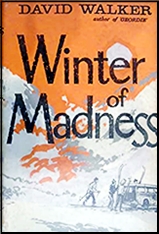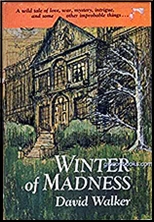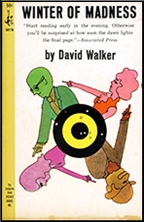Sat 4 Jul 2020
Reviewed by David Vineyard: DAVID WALKER – Winter of Madness.
Posted by Steve under Reviews[5] Comments
DAVID WALKER – Winter of Madness. Collins, UK, hardcover, 1964. Houghton Mifflin, US, hardcover, 1964. Pocket Cardinal 50176, US, paperback, 1965.

So opens Tarquin Auchartt Duncatto, thirteenth Baron of Duncatto of Duncatto (“Tarquums darlingâ€) from his Swiss hotel room as his beautiful not quite rich American wife Lois bathes nearby and he prepares to put to paper the recent events of the annual Christmas Party at his Scottish estate.
And it is no weekend party with a nice polite murder or two à la Agatha Christie.
All hell breaks loose, to be exact.
Guests include: Harry Zanzibar Gilpin, American Ambassador to Chile; Baroness Duncatto’s best friend the oft married and widowed Grafin Gloria Von Wonne (an absolute humdinger of a little peach) and her homicidal child Theodore (plump and inscrutable); the mysterious and somewhat naive but nearly perfect Caesare Campari (great shot, great artist, and the nicest chap I ever knew); Bud Gravel and Mabel Boulding (the one in Microfission the other in Biotronics); the Duncatto’s oversexed daughter Tirene; possibly the Russians, the Mafia, a possible infernal machine, open warfare — some of it fought in armor on a private ski run — various servants like the outspoken gillie Hamish Geddes and Duncatto’s nearly perfect man Bray; and one other guest, big game hunter Colonel Tiger Clyde (“I’m Clyde. They call me Tiger. So do you.â€), handsome, devastating to women — not the least Duncatto’s wife Lois and daughter Tirene — ruthless, and what you get when your friend, X of the Civil Service, decides you might have an infernal device in your backyard and James Bond is out of town.

I was fifteen when I first ran across Winter of Madness in a Pocket Books edition, and I have to be honest that rereading it at seventy I get for more of the innuendo and double entendre now than I did then, but rediscovering it reminds more than ever why it is one of my favorite books of all time.
Not many books read fifty-five years later can stand that test.
Imagine, if you can, P. G. Wodehouse and Dornford Yates collaborating with Ian Fleming, Vladimir Nabokov, Leonard Wibberley, and Kingsley Amis and you get something of the idea of a book that is a delight from start to finish. Inventive, playful, darkly humorous, and all orchestrated like an Ealing Comedy crossed with a James Bond movie with a touch of Dr. Strangelove thrown into the mix.
Only Richard Condon ever led me more happily down the garden path.

David Walker was a Scottish writer best remembered for the beloved Wee Geordie, about a naive Scottish athlete who wanders down to London for the Olympics and takes home the gold. It was made into a hit movie with Bill Travers as Geordie. Then there was his altogether more serious novel Harry Black, the story of a hunt for a man-eating tiger in India that becomes a re-evaluation for the hunter, a man who has never faced anything greater than himself before. That one was filmed too as Harry Black and the Tiger with Stewart Granger.
Over the years Black wrote a number of books from serious mainstream novels Where the North Wind Blows, to thrillers to more comedic books like this, Wee Geordie, and the Bond spoof Cab-Intersec. His short fiction regularly appeared in the Saturday Evening Post.
Winter of Madness is well worth seeking out if you prize genuine humor, malice, and sheer fun in your escapist reading, though you may, like Tarquin, need a rest in the mountains after you finish.
Bring tissue too, you will laugh until you cry.
July 4th, 2020 at 6:41 pm
As far as reading books is concerned, fifteen was the Golden Age for me. I probably read a book a day, sometimes two even while school was in session.
Of the books I read back then, the “adult” ones, I think all of the mysteries hold up: Ellery Queen, Agatha Christie, Rex Stout, John Dickson Car, all of them
The science fiction, what there was of it, that doesn’t hold up nearly as well. One particular author who I thought wonderful back then whom I struggle with now is Edgar Rice Burroughs. Tarzan maybe OK, but his Mars and Venus books, no way now.
I couldn’t get enough of his books back then, not now. The irony is, of course, that I’m poorer for it.
In any case, David, thanks for the review. I’ve just purchased a copy of the book online. I’m looking forward to it.
July 5th, 2020 at 1:08 am
Rare books like THE HOUND OF THE BASKERVILLES, TREASURE ISLAND, and even James Bond can transport me back to that time when I thought nothing of a book a day beyond my school work, when I might be reading the Toff of morning, Fred Hoyle in the afternoon, and maybe start a Walt Slade Western before bed with some days devoted to more substantial stuff like Kenneth Roberts NORTHWEST PASSAGE or Samuel Shellabarger and Edison Marshall.
Those were the years I met the Saint, Philip Marlowe, Sam Spade, Nick and Nora Charles, the Norths, Col. Hugh North, a few dozen of the better Bond wanna-bes, Christie, Queen, Carr, Rice, Creasey, John Buchan, Eric Ambler, Graham Greene, Lionel Davidson, John Le Carre, Rider Haggard, Talbot Mundy, Harold Lamb, Doc Savag, The Shadow, the Spider, Carter Brown, Nick Carter, Mickey Spillane, Louis L’Amour, Mike Avallone, Luke Short, Asimov, Heinlein, Anderson, Dickson, Van Vogt, Silverberg, Brunner, Smith, and ERB. That was along with my first subscription to EQMM and regular doses of F&SF, AMAZING, and FANTASTIC.
Most of them still have the magic to transport me no matter how obvious the flaws today. But this one is one that reads even better today — now that I get somethings I sort of got then but was too unsure of to be certain — and it wasn’t like there was anyone to ask.
I think you will love it. It is a romp.
July 5th, 2020 at 9:01 am
Great Writing, Davey — ya sold me.
September 15th, 2020 at 9:25 pm
Just finished WINTER…. THANKS! for recommending it!”
December 14th, 2020 at 11:41 pm
Thanks, David. Grabbed this one based on your review and especially enjoyed that being “led down the garden path” aspect you describe. It took me awhile to grasp the satirical nature of the whole work, because Walker was so clever in constructing a book where I changed my mind about four times through the first half of the work regarding exactly what it was I was reading and where it was all going. Great fun and the satire was not mean-spirited, but of the ‘sympathy with human frailty’ type, versus the vicious lampooning of one dimensional characters for the sole purpose of delivering a thinly disguised polemic.